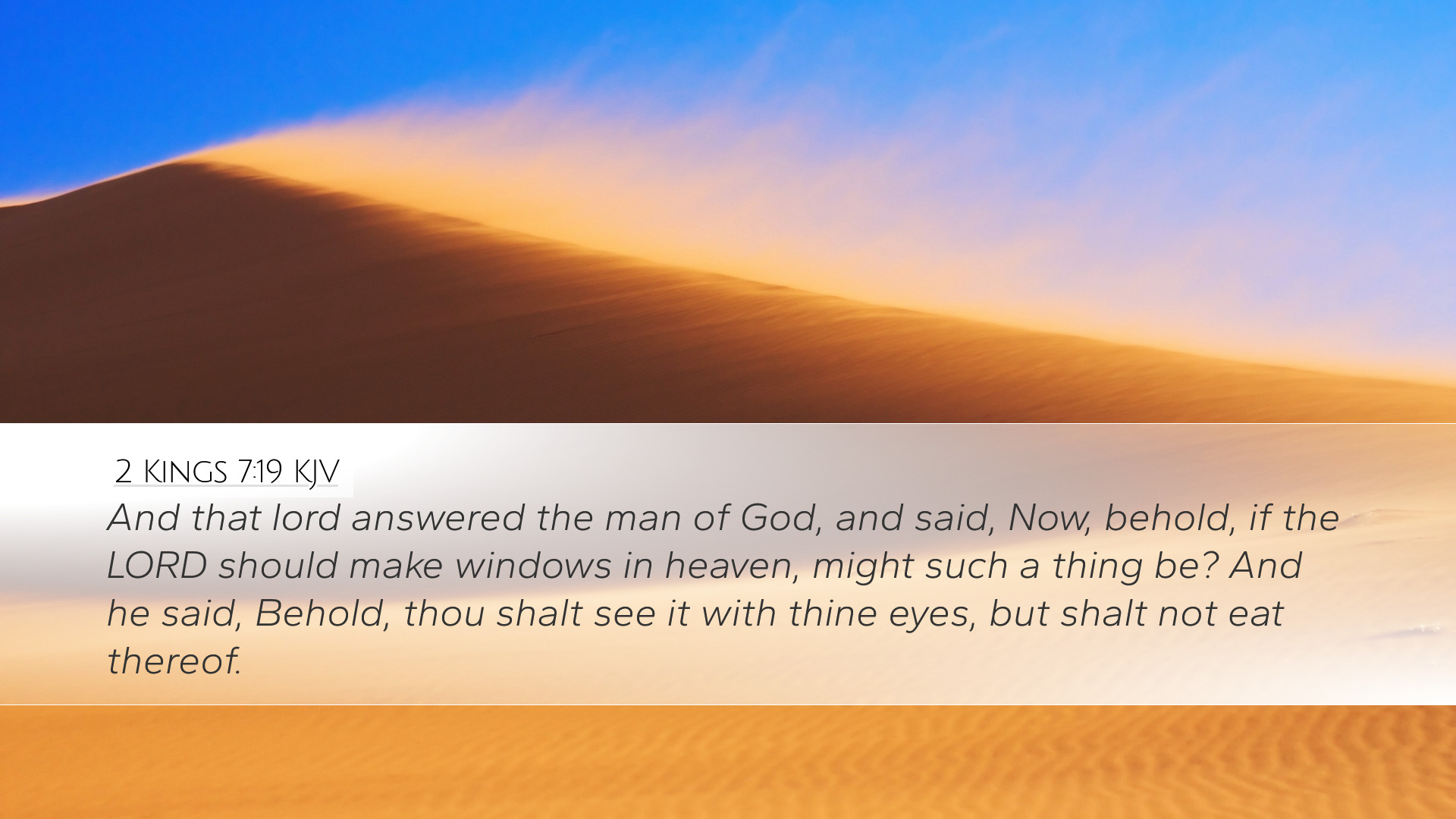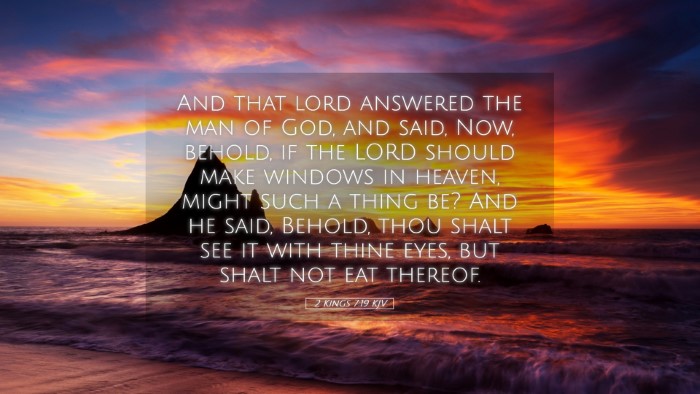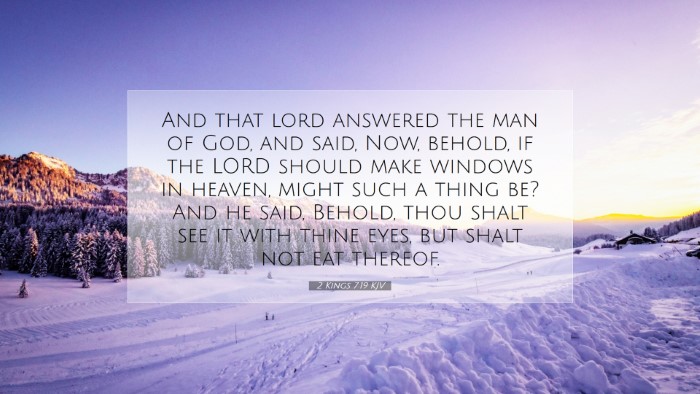Old Testament
Genesis Exodus Leviticus Numbers Deuteronomy Joshua Judges Ruth 1 Samuel 2 Samuel 1 Kings 2 Kings 1 Chronicles 2 Chronicles Ezra Nehemiah Esther Job Psalms Proverbs Ecclesiastes Song of Solomon Isaiah Jeremiah Lamentations Ezekiel Daniel Hosea Joel Amos Obadiah Jonah Micah Nahum Habakkuk Zephaniah Haggai Zechariah Malachi2 Kings 7:19
2 Kings 7:19 KJV
And that lord answered the man of God, and said, Now, behold, if the LORD should make windows in heaven, might such a thing be? And he said, Behold, thou shalt see it with thine eyes, but shalt not eat thereof.
2 Kings 7:19 Bible Commentary
Commentary on 2 Kings 7:19
Verse Overview: 2 Kings 7:19 reads: "And that officer had answered the man of God and said, Now behold, if the LORD should make windows in heaven, might this thing be? And he said, Behold, thou shalt see it with thine eyes, but shalt not eat thereof."
Introduction
This verse reveals the tension between faith and skepticism in response to divine promises. The officer’s disbelief showcases a common human response when faced with impossibilities. The response of Elisha serves as a pivotal moment, affirming that God's word will come to pass, while also illustrating the dire consequences of doubt.
Contextual Background
To fully appreciate 2 Kings 7:19, it is essential to understand the historical context of the passage. Samaria was under siege by the Arameans, and famine had gripped the city. Amidst this desperation, the prophet Elisha prophesied abundant provision from God, which seemed impossible to the officer serving the king. His response reflects both the fear of the present circumstances and a lack of faith in God’s capacity to intervene.
Verse Analysis
Disbelief of the Officer
The officer’s exclamation, “if the LORD should make windows in heaven,” illustrates the depth of his skepticism. Matthew Henry highlights this phrase as an expression of the worldly reasoning that often overtakes us when faced with trials. The notion of 'windows in heaven' symbolizes a miraculous provision that he deemed improbable.
Prophet Elisha’s Assurance
In contrast, Elisha’s confident declaration that the officer would see the fulfillment yet not partake in it is a striking reminder of the ramifications of disbelief. Albert Barnes comments on this as a prophetic warning, emphasizing that faith is not merely an acknowledgment but an acceptance and participation in God’s promises.
Theological Implications
This passage challenges the readers’ understanding of faith and divine provision. It underlines that God’s plans often transcend human understanding and logic. Adam Clarke comments on the officer’s fate as a tragic example of how doubt can lead to exclusion from God's blessings. This serves as a theological warning for believers about the importance of faith amid adversity.
Faith vs. Skepticism
This tension is a recurring theme throughout scripture. The officer represents those who question God’s word based on their limited experiences and perceptions. In comparison, Elisha as a prophet embodies the faith we are called to maintain. Reflecting on Hebrews 11:1, “Now faith is the assurance of things hoped for, the conviction of things not seen,” provides a broader biblical context for understanding the necessity of faith.
The Nature of God’s Promises
God’s promises are often made in situations that seem impossible. When the conditions appear dire, God frequently works in ways that astonish human understanding. This narrative encourages believers to trust in God’s words over their circumstances. Elisha’s prophecy of abundance serves as a testament to God’s sovereignty and His ability to supply beyond what humans perceive as feasible.
Practical Applications
This verse prompts several practical lessons for pastors, theologians, and students of scripture:
- Encouragement to Faith: In moments of despair, believers are called to remember God’s faithfulness and to lean into His promises. This narrative serves as encouragement to trust in God’s provision, even when it seems unlikely.
- Warning Against Unbelief: The experience of the officer serves as a cautionary tale—our doubts may result in spiritual consequences. Believers are reminded that skepticism can lead to missing out on the blessings God has prepared for them.
- God's Sovereignty: Recognizing that God operates beyond our understanding allows believers to rest in His supremacy over circumstances.
Conclusion
2 Kings 7:19 not only details a historical event but also provides profound theological insights that resonate throughout generations. The interaction between Elisha and the skeptical officer serves as a teaching tool about the importance of faith, the nature of God’s promises, and the risks of doubt. As we meditate on this passage, let it cultivate a deeper reliance on God and the understanding that His plans transcend our comprehension.


